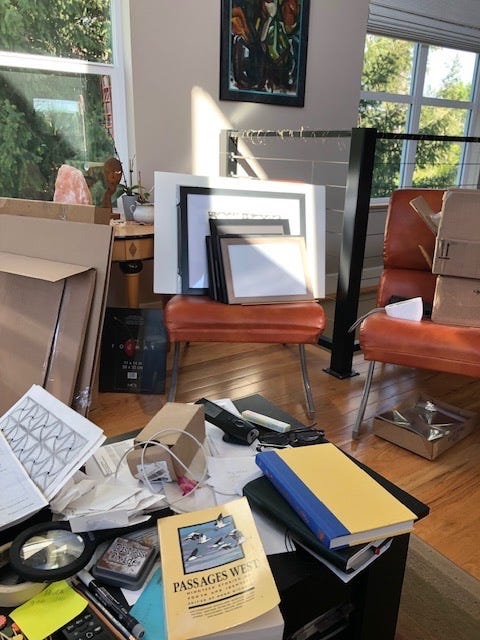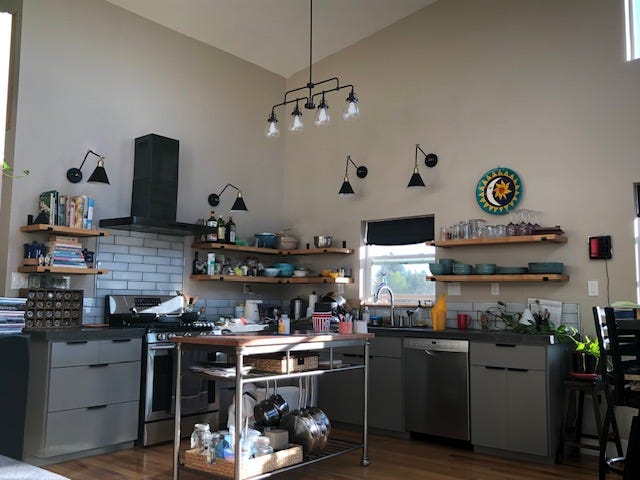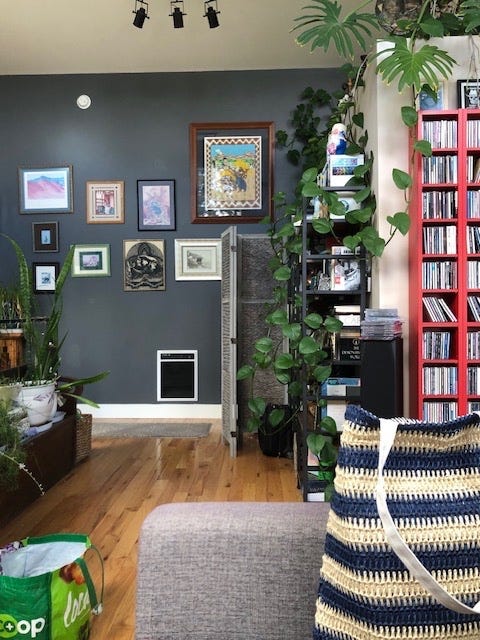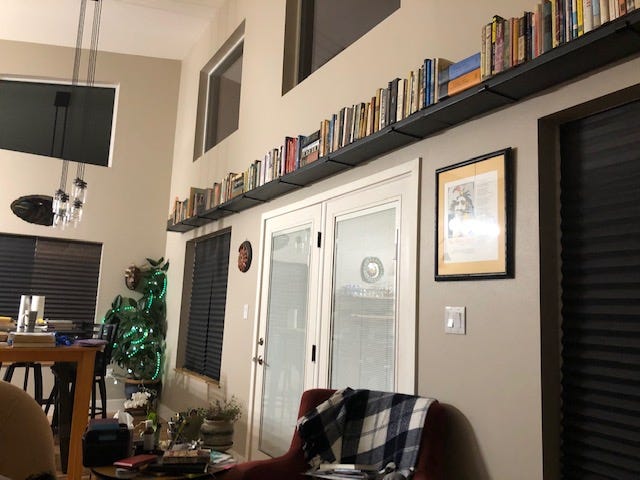IN THE EVENT OF YOUR SUDDEN DISAPPEARANCE
What would your junk say about you?
The state college I attended required incoming freshmen to write an essay. Hundreds of us filled the auditorium to scribble in floppy blue books in the hopes of skipping freshman composition. The prompt was this: “In the event you were suddenly rendered incognito, what might investigators learn about you in a search of your home?”
I’ve thought of this prompt many times over the years, stopping to consider my surroundings and whether they were fit for anyone who might have to sort through things in the case of my disappearance.
Right now it’s a bit of a mess. I have entered work in an artwalk, so there’s a dozen paintings in frames and the boxes they are to be packed in stacked on a pair of chairs. Although I’m in the process of moving operations into the new studio, for years I’ve done my writing, editing, and consulting work while lounging on the sofa with a laptop on my lap. Because of that, the coffee table beside me is stacked with the paraphernalia of a writer’s work: books, papers, pairs of reading glasses that are no longer strong enough, Scotch tape, a roll of masking tape, holiday cards I’ve addressed but never mailed, an igniter for our cooking range for whenever I ever remember to take it with me on whatever trip to Spokane to match with a replacement part so that we’ll have a spare. I’m guessing that will be after the existing one goes out, which it does, every eight or nine months or so. Two drawings without frames that I decided not to enter into the artwalk. Vintage-color distress oxide for an art project I need to finish. My cell phone. My planner. The remote control for our propane heater. The remote control for our gigantic ceiling fan (seriously, it’s six feet in diameter). Tissues used and not used. My granddaughter’s graduation announcement. The book I’m reading. Several pair of earrings and a necklace I’ve been too lazy to walk to the bathroom to put away. Pens. Pencils. Eye drops. Vitamins for my eyes. My daily blood pressure pill. A meat skewer for some imagined art project. Cute drink twizzlers for some other imagined art project. Paid bills. Bills coming due. A lighted 4x magnifier for reading anything smaller than a 12-point font. Random coins. A stack of priority mail envelopes in case I ever decide to ship the hardback copy of Richard Selzer’s collection of essays, The Exact Location of the Soul, I bought as a thank you for my orthopedic surgeon, who moved away two years ago now. I doubt he even remembers me, but by the time he’d replaced two of my joints, right hip, left knee, we’d known each other long enough that I felt certain that in a birds of a feather kind of way he might appreciate reading Selzer’s perspective on humanity, especially with regard to his essay “The Masked Marvel’s Last Toehold.” Selzer, a professor of surgery at Yale University, once had to amputate the famed wrestler’s legs—both of them.
I thought my surgeon might feel better about having to cut off both of mine, which is exactly what happens when you have a joint replaced.
The tabletop is scissor-hinged and lifts to access eight square feet of storage. When closed, a convenient slot is created through which to deposit receipts for next year’s taxes. Voila! Instant filing system. Instant repository for anything flat that I don’t know what to do with, which is why there are also manuscript drafts and greeting and thank you cards that people regularly send me, no matter how slow I am at getting around to responding in return. Maybe I’m a bad citizen, I don’t know, but certainly not an overtly appreciative one, from appearances. No matter that I keep those cards for bad days when I think I haven’t made a drop of difference in the world.
That coffee table top never gets lifted otherwise except on March 31 or in case I need evidence of having paid a bill. Right now it’s half empty. By January, the mass of documentation will be about the size of the Colosseum. It will have surpassed the height of our sixteen-foot ceiling, threatening to burst through the windows. I will have to sort through every scrap of it to do taxes, which is why I can never begin until the end of March. I postpone facing it for as long as I can.
The sorting will involve a full-size grocery bag, which will end up stuffed with wads of paper that never needed saving to begin with, like pizza receipts and mint patty wrappers and catalogs with dog-eared pages of things I’ll never order that got stuffed in the slot because company was coming, a testimony to my profound laziness that I can’t walk twenty feet to the garbage can. It’s just that usually when company is coming there is SO MUCH to be done. Stuffing saves time.
The lower level of the coffee table is housed with books and books and books and books, six years of old planners, unread magazines, essay drafts, drafts of my latest collection of poems, and the cases for all those now-too-weak pairs of reading glasses. If you need a set, I’ve got 1.00s through 2.00s. Hit me up.
Comes with case.
From there it’s sort of a lord-have-mercy situation. I know. I know. You’re wondering if I’m a hoarder. I assure you I’m not. Right now you could say I’m in process. I like to call it transparent living. What goes on here in the day to day and the way we live is visible to all, always, which is to say almost nobody. The last person to visit our house was a month ago when the window washer came, and he hadn’t been here in a year. Before that I can’t remember, so you get the idea. When someone does knock on the door we are completely shocked, and say to each other “Who on earth could that be?”
That’s what we get for living in the country, I suppose. Or maybe that’s why we live in the country. Not that we’re inhospitable. More like tired. The kind of tired everyone is from pandemics and politics, inflation and climate craziness.
The kitchen is kitty-cornered across our open-concept living area, which may not sound so large, but it’s an ocean when there’s trash to be tossed. The never-spoken truth among home designers is that to choose open-concept is to choose constant chaos, so let’s be frank. Unless you are extremely tidy, which we are not, your space is going to look like a mess all the time. This is has been true especially since I started having my bones sawed off and replaced with titanium. Stuff like that trips you up, you know what I mean? You run around thinking, “I’ve had my bones sawn off and replaced with titanium, why do the dishes even matter?”
The answer is, of course, that they don’t, until there’s nothing left to eat on, and the floor has grown crunchy from dropped legumes and chip corners and a sesame seed near the sink has started to sprout where you splashed water on it and failed to wipe it up, and you find yourself considering how the food you are walking on might taste.
Being the modern couple we are, our kitchen contains open shelves. Open shelves mean two things: One, you couldn’t afford an extra ten thousand dollars for uppers, and, two, you couldn’t afford an extra ten thousand dollars for uppers.
Open shelves are quaint. They speak to much industry, especially if they are empty because you haven’t washed the dishes in a while. They are evidence that somebody once accomplished something, something powerful enough to leave empty shelves. If Phil has cleaned up lately—because when it comes to the kitchen, it’s almost always going to be him, folks, let’s face it—and the plates and bowls and cups are neatly stacked, and the cookbooks organized and no oil drips from the the bottle of fancy Tuscan olive oil just within reach of the cooking range, the level of potential in it all, in that set of steel mixing bowls, the blue Pyrex ones from the fifties, the nestled colanders, the mortar and pestle, the marble rolling pin, the jars and jars and jars and jars of herbs and honey and garlic granules and dried onion and sun-dried tomatoes and curry powder and chili flakes and peppercorns and genuine Utah sea salt—well, it’s enough to make a person like me with no ambition tremble at the emotional pull of what I should be doing, yet, thanks to my monumental powers of inertia, remains undone. Enough to make me take recipe books off the shelf to salivate over dishes I’ll never make. Enough to make me imagine what it would be like to eat a meal of my own creation. Enough to make me wonder if a person can live long strictly on ice cream and coffee.
Our open concept also includes a prep table with hanging pots and a shelf full of pans. A large water hyacinth basket holds bale jars of oats and seeds, fixings for making candles, every manner of odd-shaped bottle and jar because lord help if I ever threw away a bottle or a jar—and they have to go somewhere.
I could go on. I could talk about the open bookcases, the twenty-two foot bookshelf along the tall wall above the many windows. I could talk about how quickly and how dirty windows get when you cook in the same room as you eat, lounge, and work. I could talk about how much it costs to get someone to climb up there and clean all that stuff because I don’t trust my titanium joints that far.
I could talk about the jungle of plants threatening to overtake us because it turns out lots of windows mean lots of light and the humidity from cooking makes the atmospheres inside our house nothing short of tropical. We have more plants than an equatorial jungle.
I could talk about all the music. The CDs. The albums.
Yeah, it’s busy in here. We have no secrets and no place to hide them if we did. I’m guessing anybody who came into this place looking for clues about me would have a good time. It is all written down, after all. Follow the trail of journals. Follow the trail of notebooks. Follow the trail of sticky notes. Follow the trail of four-by-six multi-colored file cards. Follow the trail of random torn scraps from envelopes. It’s all in there somewhere.
To be fair, what I’ve just described to you is not as dire as it sounds. We’re casual but our place isn’t exactly disease-ridden. Because we’re getting older, I especially don’t see well enough to know whether a thing is truly clean or not, so we’ve had to hire help in that regard.
Which means I swipe up what is obvious, right before our helper comes, so that she only has to clean what I can’t see, and she praises us for keeping things so neat because “you wouldn’t believe how people live.”
Her visits, of course, are the source of about fifty percent of whatever is stuffed in the coffee table.




P.S. People disappear in the U.S. every day. To find out more about missing persons, go to Missing and Murdered Indigenous Women, The Missing Persons Center, and this PBS News report on recent mass deportations.


I love this title and first line. Provacative and interesting article!
Oh, thank you, Snigdha! I hope all is well with you and I hope we can get our group together soon!